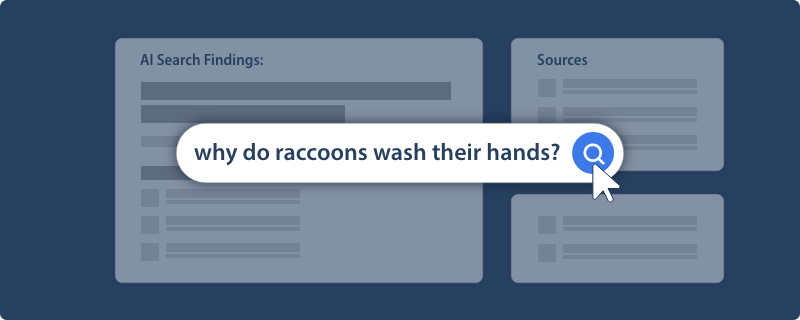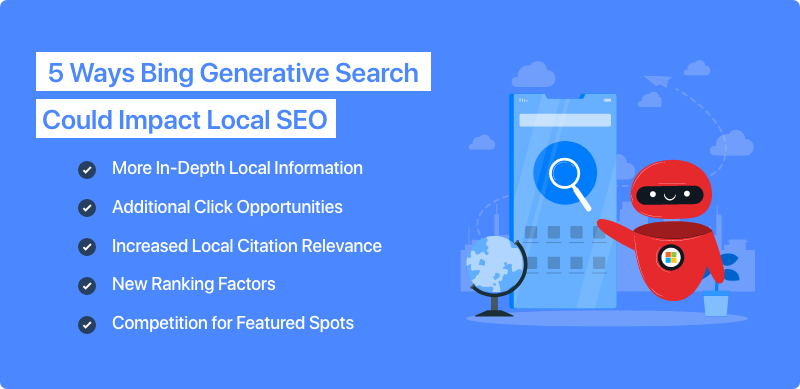With the official rollout of Google AI Overviews (formerly known as Search Generative Experience) earlier this year, generative AI search experiences have been a hot topic as of late. But did you know that Microsoft has launched its own generative AI search for Bing?
Unless you're part of the 10% or so of internet users who prefer Bing over Google for their search experience, Bing generative search might have flown under your radar until now.

What To Know About Bing Generative Search
Microsoft Announces Launch of Bing Generative AI Search
In July 2024, Microsoft introduced an early version of Bing generative search on its Bing Blogs site.
The announcement highlighted that the new Bing generative AI search feature is powered by generative AI, large language models (LLMs), small language models (SLMs), and traditional search algorithms, combining the strengths and benefits of these technologies to offer users a more dynamic and personalized search experience.
Bing generative search augments traditional search by providing detailed, AI-generated explanations tailored to a user's query, integrated directly into the search results page. These AI-generated answers are presented alongside regular search results, with clickable links and sources that allow users to explore further (much like Google's AI Overviews).
Through its use of LLMs and SLMs, Bing generative search aims to better understand queries, sift through millions of sources, and dynamically generate relevant content.
Microsoft Bing emphasized that its approach to generative AI search is designed to maintain a healthy web ecosystem by preserving traffic to content publishers, as early data suggests that website clicks are not negatively affected (due to the inclusion of clickable reference links in AI-generated answers).

Bing Expands Generative AI Search Capabilities
After slowly rolling out the feature and gathering feedback from users over several months to refine the experience before broader implementation, Bing has now announced its plans for the next steps in Bing generative search.
In October 2024, less than three months after its initial introduction of generative AI search, Bing announced that it is advancing its vision of the future of search by expanding the feature to cover a broader range of informational queries. This update allows Bing to deliver deeper, more comprehensive AI-generated answers to complex questions.
The expanded Bing generative search feature goes beyond just improving search results, also optimizing how the results are presented to create a more cohesive and user-friendly layout. This AI-powered search experience is designed to offer more than surface-level answers, helping users gain a profound understanding of the topics they are researching.
For example, a clicking on the generative search results for a query like, "Tips for leaving a good impression with a new client" will take you to a full page of AI-generated information related to the query, complete with a table of contents featuring sections on "Preparation Strategies," "Effective Communication Techniques," "Building Rapport", and more.
Each section included in the generative AI search results page lists the sources it pulls information from, so users can navigate directly to where it was originally published for even more in-depth insights.
Bing generative search results pages also feature a sidebar displaying organic search results and suggestions for related searches, giving you the option to dig in even deeper to the information you're looking for and related topics.
Microsoft Bing concluded its most recent update on Bing generative search by emphasizing that the company continues to prioritize transparency and a healthy web ecosystem by ensuring that AI-generated results include additional citations and links, encouraging users to explore further while driving traffic to publishers.
Is Bing Generative Search Available To Everyone?
Bing generative AI search is still in beta and currently only available to users in the U.S. (as of October 2024). U.S.-based users can explore the feature by typing "Bing generative search" into the search bar. This will display a carousel of demo queries that showcase how generative AI delivers detailed, relevant responses.
Will Bing Generative Search Impact Local SEO?
It's too early to say what, if any, impact Bing's generative search experience will have on local SEO. The extent and nature of this impact will depend on how the technology evolves and how it is integrated into search results for local queries. While we can only speculate at this point, here are a few potential ways Bing generative search could influence local SEO:

1. More In-Depth Local Information
Bing generative search aims to provide deeper and more comprehensive answers. For local SEO, this could mean that Bing will generate more detailed responses to queries like "best coffee shops near me" or "top-rated plumbers in [City]." This might include summarizing customer reviews, business details, and other local information more effectively, organizing it into sections with a navigable table of contents.
2. Additional Click Opportunities
Bing generative search still integrates traditional search results with AI-generated content, providing plenty of clickable links and references in the AI overview page. This could drive more traffic to local business sites or listings that are cited within the AI-generated answers, potentially increasing visibility for well-optimized local businesses.
For instance, if someone searches for "best Indian restaurants in Montreal," Bing's generative AI search results could include links to sites or listings for the top restaurants based on certain characteristics, such as dishes highlighted on the restaurants' websites or amenities mentioned in customer reviews.
3. Increased Local Citation Relevance
As Bing continues to focus on accuracy and citations in its generative search results, local businesses mentioned in/on authoritative directories, review platforms, and other locally relevant sites may gain more visibility.
4. New Ranking Factors
Bing generative search could introduce new local ranking factors or change priorities for local SEO, at least as it pertains to Bing. If Bing's generative AI search starts to emphasize certain factors, like reviews on specific listing sites, overall business prominence/reputation, or website content, local SEO strategies may need to adapt.
5. Competition for Featured Spots
Just as local businesses compete for visibility in Google's local pack in order to appear at the top of Google, above organic search results, they may find themselves competing for visibility in Bing's generative search results to appear above traditional Bing search results.
Final Thoughts
Bing generative search is still in its early stages and it will be interesting to see how the technology evolves and influences Bing SEO, including for local searches.
Although Google remains the dominant player in the search engine market with a market share of around 90% of search traffic, Bing is the second most popular search engine, and its traffic has been steadily growing, especially since it started integrating AI-driven capabilities.
As Bing continues to refine its AI-powered features, it is likely to become a more competitive alternative to Google for search users, which could potentially increase its relevance in terms of local SEO.
While it remains to be seen what exactly the impact of Bing's generative AI search on local search will look like, it may well provide local businesses with new opportunities to increase their online visibility among the approximately 100 million daily active Bing users out there.


